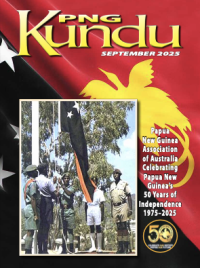40. A Nobel Prize endangered by our strict rule about Highland prisoners
Paul Quinlivan’s Snapshots
Kuru was a hideous disease unique to the Fore people of the Kainantu subdistrict and research on it led to breakthroughs which solved many medical problems. So much so that the chief researcher, Dr D.C. Gajdusek of the National Institutes of Health, Washington, was awarded the Nobel Prize. His research was, however, very nearly frustrated by the strict rule that highland prisoners could only be held in highland gaols.
On two occasions when I was Chief Crown Prosecutor (ie. between 1955 and 1960), Judge Bignold telephoned and said he wanted to do a circuit to Kainantu, next week, and could I allocate a Crown Prosecutor. On the first of these when we arrived at Kainantu there were no witnesses because of the shortness of notice so I went to Dr Gajdusek’s camp and was deeply impressed with his dedication and his phenomenal memory for the genealogy of every Fore person. He was like a machine-gun: you mentioned a name and, rat-a-tat-tat, out spewed the names of that person’s children, father, mother, brothers, sisters, grandfathers, grandmothers etc. etc. etc.
But, after giving me a few examples, he said, almost sobbing, that no matter how he looked at it, there were three maddening gaps where people had children who were obviously not theirs and where men who should be there, did not exist. I said, ‘Would those gaps have occurred in early August, 1953?’ and he went berserk. ‘How could you know that? I have never released that fact.’ I said, ‘The local people believed that the deaths you are researching were caused by a sorcerer so three of them killed one of the alleged sorcerer’s clan. Not the sorcerer, of course, but an innocent man who was searching for his escaped pig. I prosecuted them for wilful murder in August 1953 and they were sent to …’ He interrupted saying, ‘But we searched all gaols in the Highlands. That is the first thing we did, because of the rule about prisoners from the Highlands. But there is no record of any such men!’. I said that it was not ‘the Highlands’ because the rule applied long before they were discovered. It was ‘any person from an area of high altitude’ – and the three men were at Wau gaol (3,500 ft). I have never seen anyone more relieved. His gaps were filled and his research was able to proceed!


